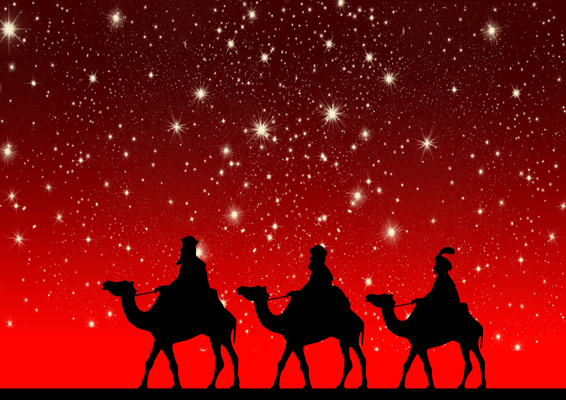Seek Jesus

Jesus was born in Bethlehem in Judea, during the reign of King Herod. About that time some wise men from eastern lands arrived in Jerusalem, asking, “Where is the newborn king of the Jews? We saw his star as it rose, and we have come to worship him.” Matthew 2:1-2.
Although we try to keep Christ in Christmas, many of our ideas about Christmas aren’t Bible based.
For example, although angels visited the shepherds, there is no mention of them being present at Jesus’ birth but, chances are, there’s an angel watching over the holy family in most nativity scenes.
Perhaps the most glaring example of misinformation, however, regards the wise men.
The names Gaspar, Melchior, and Balthazar, while good to know when playing trivia, are simply the stuff of legends and not the Bible.
Moreover, there weren’t necessarily three of them, they weren’t kings, and the shepherds weren’t present when they met Jesus.
We can blame John Henry Hopkins, the Pennsylvania clergyman who wrote the song, “We Three Kings” for much of our confusion.
He wrote the carol in 1857 as a special treat for his nieces and nephews and used it in a Christmas pageant that year.
Published in a collection of hymns and carols in 1863, it’s been sung around the world ever since and most people are now convinced there were three kings.
The magi or wise men, however, weren’t kings; they were probably priests, court advisors, or even astrologers from a land or lands to the east such as Mesopotamia, Persia or Arabia.
Ancient astrologers interpreted major astronomical events as signaling the birth of a king.
Whether it was the conjunction of the planets Jupiter, Saturn and Mars or a supernova, these wise men knew it was a special sign.
Familiar enough with the Old Testament prophecies to quote from Micah to Herod, they knew a star would herald the Jewish king’s birth.
It was typical for kings to send emissaries from their court with gifts to another king and that may have been why these men brought such extravagant gifts to this newborn king.
While the gospels mention three gifts, it may have been as few as two or more than twelve wise men who brought them.
Since they travelled long distance and stopped to see Herod in Jerusalem, the wise men wouldn’t have arrived immediately following Jesus’ birth.
Jesus was probably a toddler when they finally arrived and found Him in a house with Mary.
While the wise men sought to worship the new king-
Herod sought to kill him; his decision to kill all boys two years and younger ties in with this timeline.
Although they make a nice addition to our nativity scenes, the wise men weren’t there.
Even though those wise men don’t belong in our nativity scenes-
– they are an important part of the Christmas story.
Although Jesus’ birth announcement was made to lowly Jewish shepherds-
His first worshipers were respected and scholarly Gentiles.
A messiah had been promised to the Jews but it was foreigners who sought Him, recognized His value, presented Him with precious gifts and worshipped Him.
They may have been Gentiles, but they recognized the King of the Jews.
Moreover, instead of returning to Herod as he’d ordered-
– they were obedient to God when they returned home another way.
The presence of the wise men is a reminder that-
Jesus, the promised Messiah, came to save all of mankind.
The wise men remind us to-
– seek Jesus and
– recognize Him as our saviour,
– present Him with our gifts and worship him,
– and to obey God even when He sends us in a different direction.
(PR)